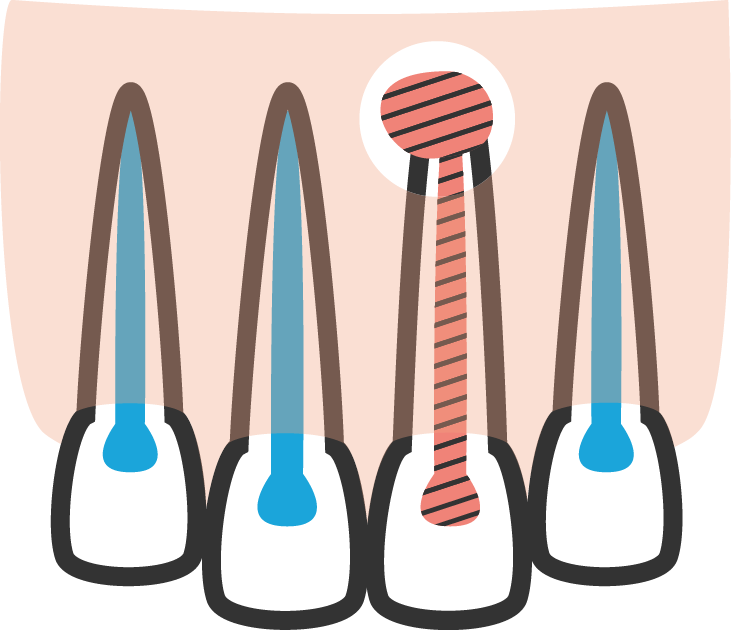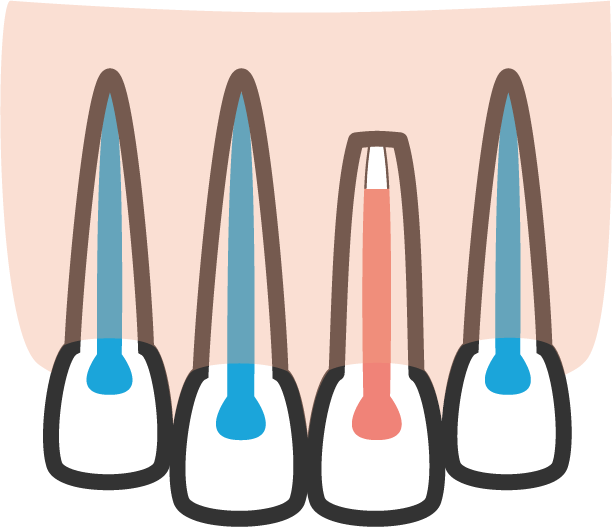Endodontic Surgery
You may need endodontic surgery if non-surgical root canal treatment has not produced a successful result. After surgery, the bone typically heals naturally around the root over a period of many months restoring the tooth to full function. We may recommend surgery when:
- a tooth that previously had root canal therapy continues to cause persistent symptoms or infection that can’t be explained radiographically (x-ray).
- there is unusual root anatomy or calcified canals that obstruct access to the canals necessary for performing root canal treatment. Surgery allows the doctor to clean and seal the portion of the canal that was inaccessible.
- there is a damaged root surface or surrounding bone.

Inflamed or infected tissue, in the bone, at the root end.

Root end filling in place and the bone has healed.
Signs and Symptoms
You may experience tooth pain when eating/chewing, sensitivity to hot or cold that lingers, or tenderness/swelling in your face or gums near the area of the painful tooth.
Pre-Op Instructions
- Do not take aspirin or Motrin for 7 days prior to your surgical appointment, unless advised to continue by your medical doctor. Continue to take any other prescribed medications at the normal time and dosage.
- If you require antibiotic premedication, remember to take your prescribed dosage one hour before your appointment. Please inform the doctor or our clinical staff if you are in need of a refill prescription for your pre-medication.
- Please fill the Peridex prescription. Follow the instructions on this prescription the day before your surgery and bring it with you to your surgical appointment.
- Due to the length of surgical appointments, please contact our office with as much advance notice as possible should you need to cancel or reschedule.
Recommendations
- Eat breakfast or lunch prior to your scheduled surgery, or at least a nutritious snack to avoid an empty stomach.
- Practice extraordinary dental hygiene (tooth brushing and flossing) for several days prior to your surgical appointment to insure better post-op healing.
- For gentlemen with facial hair (moustache or beard) we prefer that you trim the hair as short as possible.
- Ask someone to accompany you the day of your surgery, however this decision is ultimately yours. You will be given a local anesthetic prior to your surgical procedure which for most patients does not present a problem.
Post-Op Instructions
It is normal to experience some bleeding during the first day, discomfort or slight swelling for several days, or facial discoloration (black or blue) which may last 7-10 days. Apply an ice pack to your face in the area of the surgery, 15 minutes on, 15 minutes off for the next 6 hours to keep the swelling and discomfort to a minimum. We can also recommend a pain medication to alleviate your discomfort. You may also have numbness in the surgical area which is known as paresthesia. It is usually a temporary condition which can last for a few days to several weeks. You may also have numbness in the surgical area which is known as paresthesia. It is usually a temporary condition which can last for a few days to several weeks.
Day of surgery:
- Plan to head home immediately after surgery and limit your activities for the entire day — nothing strenuous! Most patients return to work and resume normal activity the day after your surgery.
- Return to our office for your suture removal appointment within 5-7 days following surgery. This will be a very short visit and our staff will do their best to accommodate your schedule.
Day after surgery:
- Rinse with Peridex after each meal until your suture removal appointment.
Do not stretch your lip or cheek in an effort to view the surgical area. This may tear the stitches and reopen the incision. - Keep your mouth as clean as possible by gentle tooth brushing beginning the day after your surgery. This helps to prevent infection and aid in the healing process.
- Avoid hard foods the day of your surgery. If your surgery was performed on a front tooth, avoid biting into hard foods, such as sandwiches, apples, carrots, etc. We suggest that all food be cut in small pieces and placed to the opposite side of your mouth, avoiding the surgical area.
References
Are you interested in learning more about endodontic surgery? These references from the American Association of Endodontics (AAE) are a great starting point.
AAE: Endodontic Surgery Explained
AAE: Endodontic Surgery Educational Video